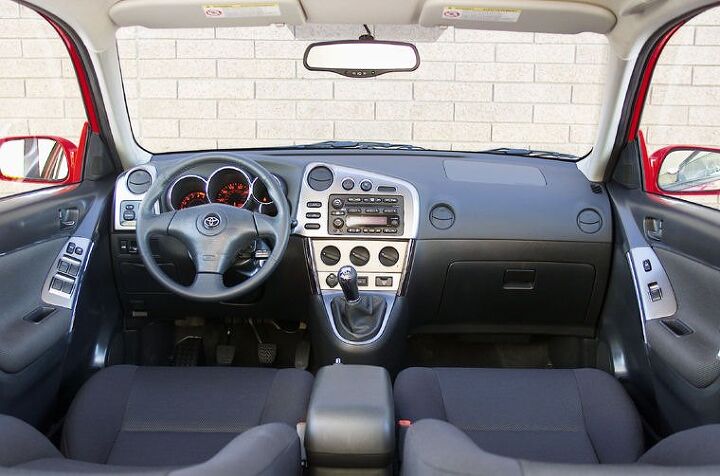Ask Jack: Should This Matrix Owner Take The Blue Pill Instead?

Welcome back for another installment of “Ask Jack”, the place for you, the man on the street, to ask me, the man on the Internet, any question you like on any topic that makes its way into your mind.
Today’s question seems like a simple one: do you stay in the Matrix or not? In this case, the Matrix is a Toyota Matrix, with the all-too-common manual-transmission failure. But to properly answer the question, we’ll need to consider everything from solo ocean journeys to bad seeds in a magic bus.
My friend Chris lives in the Toronto area where he works in a variety of creative fields and plays the occasional gig on guitar or bass. He’s not afraid to spend real money on top-end musical instruments or home-stereo equipment, but when it comes to cars he prefers economy to excitement. After driving a last-generation Mercury Tracer into the ground, he switched to a five-speed Toyota Matrix a few years back. His general experience with the car has been positive; he likes the little wagon’s proportions, utility, and light weight. He particularly likes shifting for himself, which is something he hadn’t done in a long time prior to buying the Tracer.
Unfortunately for Chris, however, that manual transmission has a problem. Last week, his gearbox stopped working. In fact, pretty much all of the Corolla/Matrix five-speeds from that era eventually fail. It’s apparently a case of too much load on a bearing. The same transmission, fortified with a sixth speed and a heavier-duty bearing, is bulletproof, so a lot of devoted Matrix five-speed owners search out a six-speed box and swap it out.
There are problems with that course of action. The first is that the six-speed box was never that common, even north of the border. The second is that even at the $1,000-1,500 that you’d pay for what you hope is a sound example of the “C60” transmission, the total cost to swap and do a new clutch at the same time can come pretty close to $3,000. A decent used Matrix XRS with the transmission already installed can be had for between five and six grand. So does it make sense to simply abandon the current car and move up to the XRS, which in addition to the better transmission also has a bit more poke from the engine room?
Which brings me, naturally, to one of my favorite books ever: “ Deep Survival” by Laurence Gonzales. The idea behind “Deep Survival” is to understand the choices that make some people natural “survivors” and others natural victims of circumstance. It’s one of the few books that I recommend to pretty much everybody I know, although if you’re already of a cautious or retiring nature it won’t help you to read multiple stories about people who died in the woods just an hour’s walk away from a major freeway.
The most important lesson I took away from Deep Survival is this: Don’t ever let the momentum of one decision carry on into the next. Again and again in the book you’ll meet people who died because they did not turn around when they realized they’d made a wrong turn. It sounds ridiculous, right? You are hiking in the woods. You go left where you should go right. Six hours later, you realize that your decision was wrong. What do you do?
If you are a strictly rational human being, you will retrace your steps to the wrong turn and then make the right turn. And you will survive. Most people, however, will not do that. They will continue on in the wrong direction, hoping that this direction will also end up taking them out of danger, and that their incorrect decision will end up being validated after all. That desire is strong enough to kill people, and it does so all the time. Gil Scott-Heron has some advice about this:
No matter how far wrong you’ve gone / You can always turn around. If you want the same lesson with a little more guitar technique, Lucky Peterson has you covered.
It stands to reason that if this human characteristic is strong enough to force people to literally walk to their deaths, it has the potential to also cause other bad decisions. Those bad decisions can range from having a Cavalier tattooed on your leg to not kicking a woman out of your house when it’s plain that the whole enterprise has long since fallen apart. Very few people are willing to just turn around and walk away from their existing decisions.
So let’s look at this issue of the Matrix with the busted transmission. It’s got close to 200k miles on it, which means that it will need all sorts of maintenance and repair items in the future. None of those costs will be in the slightest fashion ameliorated by putting a new transmission in the car. So the first thing to do, in my opinion, is to thoroughly check over the car and get a sense of how much it would cost to bring it up to new-showroom spec. At that point, Chris should compare that number to what it would cost him to buy a six-speed Matrix in excellent condition, minus the junk value of his current car. If the second number is lower, I think the only sane thing to do is to buy a six-speed Matrix.
If the second number is higher, then it becomes a question of how much Chris’s time and aggravation is worth. If the difference in favor of the old car is $100, then who among us would actually go through the hassle of getting the swap done? But what if it’s a grand? What if it’s two grand? Three? That’s when the emotional involvement with the current choice of car gets involved.
Obviously, the cost numbers — and the choices — change a bit if Chris has the time, space, and equipment to make the swap himself. He’s a pretty bright guy and he’s rebuilt a Fender Rhodes piano, so I can’t imagine that swapping a transmission would be a deal-breaker for him. On the other hand, he might be able to make more money working in his actual field of expertise for the same amount of time he would spend under his car. Incidentally, this is why I have a low opinion of the professional ability of the few lawyers I know who also restore cars as a paying hobby. A top-rank attorney’s time is worth as much as it would take to engage four mechanics in the Ferrari Classiche department.
My feeling on the matter is this. A good XRS Matrix with less mileage than Chris’s current car can be had for $5,500. I’d buy that and I’d either part out or junk the old car. The alternative is to spend nearly three grand on the current vehicle, knowing full well that it won’t ever be as fast or as interesting or as valuable in the resale market as the XRS would be. Getting a car with lower miles in better condition will also help with some of those other unpredictable costs. In the long run, I think it would be a wash.
So my advice is: Matrix XRS, as new and as low-mileage as he’s willing to get. What about you, readers? Am I right or wrong about this? The last thing that Chris said to me was, “You know, I could just get a Focus ST, too.” Now there’s an option. But it won’t be a cheap one.

More by Jack Baruth
Latest Car Reviews
Read moreLatest Product Reviews
Read moreRecent Comments
- Redapple2 Dear lord ! That face. HARD NO.
- Urlik Let’s ban for all. Having that data anywhere leaves it open to the Chinese government potentially hacking systems to get the data.
- Redapple2 Gen 1 - 8/10 on cool scale.Gen 2 - 3/10.
- SCE to AUX "...to help bolster job growth and the local economy"An easy win for the politicians - the details won't matter.
- Kjhkjlhkjhkljh kljhjkhjklhkjh so now we will PAY them your tax money to build crappy cars in the states ..


































Comments
Join the conversation
Save for the Limo!
"Don’t ever let the momentum of one decision carry on into the next" Excellent advice. Why then limit Chris to buying another Matrix?